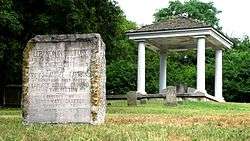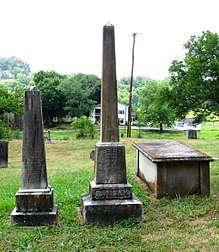Lebanon in the Forks Cemetery
|
Lebanon in the Forks Cemetery | |
 The Lebanon in the Forks Cemetery in 2010 | |
| Location | Knoxville, Tennessee |
|---|---|
| NRHP reference # | 10000934 |
| Added to NRHP | November 29, 2010 |

The Lebanon in the Fork Cemetery, also known as Three Rivers Cemetery,[1] is a historic cemetery located at 2390 Asbury Road in eastern Knoxville, Tennessee, U.S..
The Lebanon In The Fork Presbyterian Church was founded during 1791 by the Rev. Samuel Carrick.
Francis Alexander Ramsey, father of J.G.M. Ramsey later donated nine acres of land overlooking the wide confluence of the Holston River with the French Broad River, where the "fork" and beginning of the Tennessee River is formed.
The Lebanon In The Fork Presbyterian Church at this site provide by Ramsey was constructed of rough hewn logs and measured approximately 40 feet by sixty feet.[2]
The Lebanon in the Fork Presbyterian Church (no longer extant) pastors included Samuel Carrick,[3] Isaac L. Anderson,[4] J. G. M. Ramsey and Richard Owen Currey.[5] The church cemetery has been listed on the National Register of Historic Places since November 29, 2010.[6]
According to an account of a visit to Mecklenberg by "Ora," a correspondent of the Mobile Advertiser, (and later republished in within the April 6, 1862 edition of the Knoxville Register), the J.G.M Ramsey's Mecklenburg residence was located about 100 yards from "...the ruins of the old Presbyterian Church of Lebanon".[7]
The nearby historic Ramsey House (also known as "Swan Pond", the residence of Francis Alexander Ramsey and his family) offers guided tours of this residence that was built by Francis Alexander Ramsey. The Ramsey House also maintains the Lebanon In The Fork Presbyterian Church cemetery.
The Lebanon In The Fork Presbyterian Church Cemetery is easily accessible from Interstate 640 in Knoxville:
head northeast on I-640 E to US-11E N/US-25W S/US-70 E;
use the left two lanes to merge onto I-40 E toward Asheville;
take exit 394 for US-11E/US-25W/US-70;
turn right onto TN-168 W;
turn right onto Strawberry Plains Pike;
turn left onto Thorngrove Pike, and;
follow Thorngrove Pike to either of the two entrances for Asbury Road.
References
- ↑ Buckles, Carol K.; Faulkner, Charles H., eds. (1978). Glimpses of Southern Appalachian Folk Culture: Papers in Memory of Norbert F. Riedl. Knoxville, Tennessee: Tennessee Anthropological Association. pp. 116–118. OCLC 4453939.
- ↑ http://knoxcotn.org/old_site/churches/lebanon/lebanon2.html "Lebanon "in the Fork" Presbyterian Church Founded 1791 by Rev. Samuel Carrick ~~ Knox County's first organized church ~~ ".
- ↑ "Church History". First Presbyterian Church. Retrieved November 4, 2017.
- ↑ J.G.M Ramsey, "History of Lebanon Presbyterian Church," 26 September 1876.
- ↑ Corgan, James X. (December 25, 2009). "Richard Owen Currey". The Tennessee Encyclopedia of History and Culture. Tennessee Historical Society and the University of Tennessee Press. Retrieved November 4, 2017.
- ↑ "Lebanon in the Forks Cemetery". National Park Service. United States Department of the Interior. Retrieved November 3, 2017.
- ↑ http://knoxcotn.org/old_site/history/mecklenburg.html "A Visit to Mecklenburg by "Ora".
External links

- Google Maps link https://goo.gl/maps/3NgqsA1k8Ey